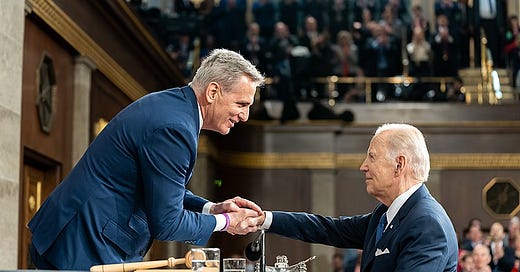US Credit Rating Remains At Risk, Despite Debt-ceiling Deal
Firm cites "steady deterioration in governance over the last 15 years," for its decision
One of the top credit-rating firms plans to keep the US government's on a negative rating, despite political leaders in Washington coming together to pass legislation to raise the federal debt ceiling.
“Although the resolution of the U.S. debt limit impasse allows the government to meet its obligations, Fitch Ratings maintains the Rating Watch Negative (RWN) on the U.S. rating, as we consider the full implications of the most recent brinkmanship episode and the outlook for medium-term fiscal and debt trajectories,” company analysts wrote in a statement released by Fitch, one of the “Big Three credit rating agencies.”
President Biden plans on Saturday to sign legislation that represents the deal he arranged with Republican House Speaker Kevin McCarthy, which will raise the federal debt ceiling in exchange for some modest reductions in federal spending as part of the raft of right-wing priorities McCarthy had sought in exchange for that debt-limit increase.
Without a debt-ceiling increase, the federal government was approaching the day at which it could no longer pay its bills, falling into default and sparking a wider economic meltdown.
The deal reached between Biden and McCarthy came only after months of political brinkmanship and contentious negotiations, and came frighteningly close to the so-called “x-date,” or the day of government default.
“Reaching an agreement despite heated political partisanship while reducing fiscal deficits modestly over the next two years are positive considerations. However, Fitch believes that repeated political standoffs around the debt-limit and last-minute suspensions before the x-date (when the Treasury’s cash position and extraordinary measures are exhausted) lowers confidence in governance on fiscal and debt matters,” the firm's statement said. “In fact, there has been a steady deterioration in governance over the last 15 years, with increased political polarization and partisanship as witnessed by the contested 2020 election, repeated brinkmanship over the debt limit and failure to tackle fiscal challenges from growing mandatory spending has led to rising fiscal deficits and debt burden.”
The debt-ceiling has become a political wedge issue whenever a Democrat occupies the White House while Republicans control even part of Congress.
The same debate emerged during President Barack Obama's presidency, and although then as well Obama reached a deal with Republicans to raise the debt ceiling, the uncertainty created by coming so close to default led another of the big credit-rating firms, Standard & Poor's, to downgrade the country's AAA credit rating for the first time.
Fitch said that it intends to revisit its negative rating of the US government in the third quarter of this year.
“The coherence and credibility of policymaking, as well as the expected medium-term fiscal and debt trajectories will be key factors in our assessment,” its statement said.
Please support our work…
Also, please subscribe…




